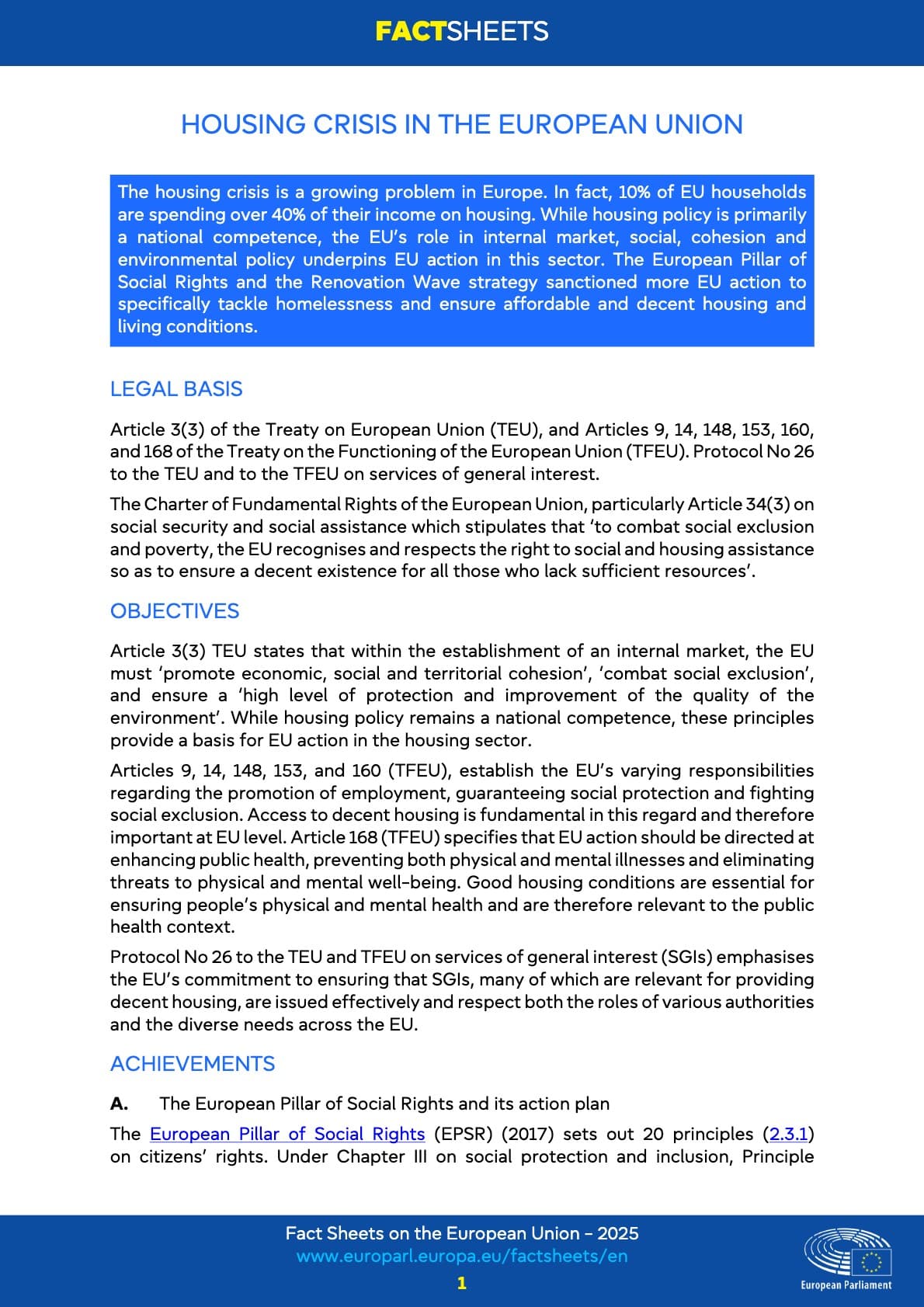AI-Generated Summary
Learn moreContext and Overview
The document, published by the European Parliament, addresses the escalating housing crisis within the European Union. It highlights the growing concern that approximately 10% of EU households spend over 40% of their income on housing. While housing policy is primarily a national responsibility, the EU plays a vital role in supporting housing initiatives through its internal market, social, cohesion, and environmental policies. Key legal frameworks, such as the European Pillar of Social Rights, lay the groundwork for EU action to ensure access to affordable and decent housing.
Legal Framework
The legal basis for EU action in housing includes Article 3(3) of the Treaty on European Union and several articles from the Treaty on the Functioning of the European Union. These articles emphasize the importance of promoting social inclusion and combating social exclusion, which includes ensuring access to decent housing. The Charter of Fundamental Rights of the EU also recognizes the right to social and housing assistance, underscoring the EU's commitment to combating poverty and social exclusion.
Objectives and Responsibilities
The document outlines the EU's objectives in addressing housing challenges. The EU is mandated to promote economic, social, and territorial cohesion while ensuring a high level of environmental protection. Although housing policy remains a national competence, the principles established provide a basis for EU actions in the housing sector. The focus on public health through good housing conditions is also emphasized, as it directly impacts physical and mental well-being.
Achievements and Initiatives
Significant achievements include the European Pillar of Social Rights (EPSR) and the Renovation Wave strategy. The EPSR outlines citizens' rights, including the right to housing and protection for homeless individuals. The action plan aims to eradicate homelessness by 2030 and reduce poverty across the EU. The Renovation Wave strategy, part of the European Green Deal, targets energy efficiency improvements in buildings, aiming to double renovation rates by 2030 and achieve a decarbonized building stock by 2050.
Housing Task Force and Policy Guidelines
In response to the housing crisis, the European Commission has appointed a Commissioner responsible for housing and energy. The new Housing Task Force is tasked with developing the first-ever European Affordable Housing Plan, set to be introduced in 2026. This initiative aims to create financing opportunities for affordable and sustainable housing across Europe, alongside commitments to enhance cohesion policy investments in this sector.
Role of the European Parliament
The European Parliament has played a crucial role in shaping housing policies. Resolutions have called for improved access to decent housing and the establishment of national homelessness strategies. The Parliament has also emphasized the need to address the housing burden, particularly for vulnerable groups. The recent establishment of a Special Committee on the Housing Crisis will focus on mapping current needs, analyzing existing policies, and proposing solutions for sustainable and affordable housing in Europe.
Future Directions
The document highlights ongoing efforts to regulate short-term rental platforms and ensure fair taxation in the housing sector. The European Parliament's work on cohesion policy investment aims to address the housing crisis effectively. The need for updated policies for the period 2021-2027 and beyond is underscored, indicating a commitment to improving housing conditions for all EU citizens.
